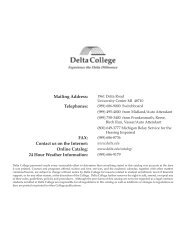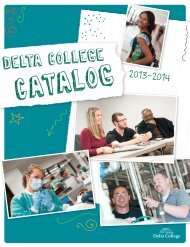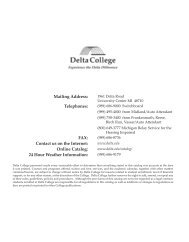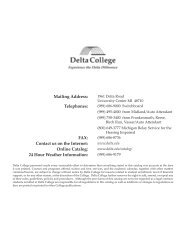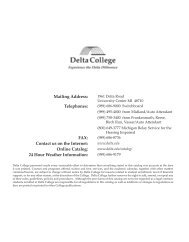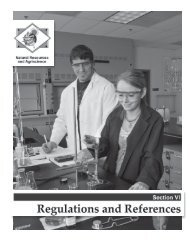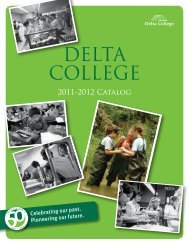2012 - 2013 catalog - Delta College
2012 - 2013 catalog - Delta College
2012 - 2013 catalog - Delta College
You also want an ePaper? Increase the reach of your titles
YUMPU automatically turns print PDFs into web optimized ePapers that Google loves.
EDU 395RW Introductory Theory and Methods of<br />
Reading Across Disciplines - Research Option 2<br />
Sem Hrs<br />
Prerequisite: Open to all full-time and part-time faculty or by permission<br />
of instructor. Introduces theory and practice of reading across disciplines<br />
including theories of reading development and strategies improving<br />
reading. Provides instruction and support in researching content area<br />
reading in individual disciplines. Leads to development of annotated<br />
bibliography about reading process and pedagogy in their discipline.<br />
Student may earn credit in only one of the following: ED 395R, ED 395,<br />
EDU 395R or EDU 395. (30-0)<br />
EDU 395W Introductory Theory and Methods of<br />
Reading Across Disciplines<br />
1 Sem Hr<br />
Prerequisite: Open to all full-time and part-time faculty or by permission<br />
of instructor. Introduces theory and practice of reading across disciplines<br />
including theories of reading development and strategies improving<br />
reading. Student may earn credit in only one of the following: ED 395,<br />
ED 395R, EDU 395 or EDU 395R. (15-0)<br />
EDU 396PW Facilitating Developmental<br />
Learning with project<br />
3 Sem Hrs<br />
Prerequisite: Open to all full and part-time faculty and staff. Explores<br />
the process of assisting students in advancing from under-prepared to<br />
college-ready. Examines instructional methods conducive to promoting,<br />
developing, and sustaining student learning and success throughout the<br />
college curriculum. Synthesizes theory with best practices applicable to<br />
a variety of disciplines and learning levels. Course includes individual<br />
project. Credit may be earned in only one of the following: ED 396P, ED<br />
396, EDU 396P, or EDU 396. (45-0)<br />
EDU 396W Facilitating Developmental Learning 2 Sem Hrs<br />
Prerequisite: Open to all full and part-time faculty and staff. Explores<br />
the process of assisting students in advancing from under-prepared to<br />
college-ready. Examines instructional methods conducive to promoting,<br />
developing, and sustaining student learning and success throughout the<br />
college curriculum. Synthesizes theory with best practices applicable to<br />
a variety of disciplines and learning levels. Credit may be earned in only<br />
one of the following: ED 396P, ED 396, EDU 396P, or EDU 396. (30-0)<br />
EDU 397 Introduction to Distance Learning 3 Sem Hrs<br />
Prerequisites: Open to all full and part-time faculty and staff and by<br />
permission of instructor. Teaches strategies for distance education<br />
technology, with particular emphasis on instructional design, two-way<br />
interactive television (ITV), for application in any field. Credit may be<br />
earned in ED 397 or EDU 397 but not both. (45-0)<br />
EDU 398W Writing to Learn 1 Sem Hr<br />
Prerequisite: Open to all full and part-time faculty and by permission of<br />
instructor. Introduces theory and practice of “writing to learn,” (WTL)<br />
including informal writing strategies to promote student response to<br />
lectures, readings, fieldwork, labs, discussions, etc.; rehearsal for other<br />
activities including discussions and formal writing; reflection on learning<br />
progress and problems; and dialogue with peers and instructor. Credit<br />
may be earned in ED 398 or EDU 398 but not both. (15-0)<br />
EDU 399AW Classroom Assessment Techniques .5 Sem Hr<br />
Prerequisite: Open to all full and part-time faculty and staff and by<br />
permission of instructor. Introduces classroom assessment techniques<br />
(CATs) and their use across disciplines. Develops and applies a variety<br />
of CATs to formatively assess different types of learning and student<br />
development. Credit may be earned in ED 399AW or EDU 399AW but<br />
not both. (7.5-0)<br />
EDU 399W Using Classroom Assessment<br />
Techniques<br />
2 Sem Hrs<br />
Prerequisite: Open to all full and part-time faculty and staff and by<br />
permission of instructor. Introduces classroom assessment techniques<br />
(CAT’s) and their use across disciplines. Develops and applies a variety<br />
of CAT’s to formatively assess different types of learning and student<br />
development. Includes investigation and development of CAT’s as<br />
tools for classroom research. Credit may be earned in ED 399 or EDU<br />
399 but not both. (30-0)<br />
Electronic Engineering Tech<br />
EET 120 Digital Circuits 3 Sem Hrs<br />
Prerequisite: MTH 107 or H.S. equivalent. Studies fundamental concepts<br />
of digital electronics, including the +5 volt TTL family of integrated<br />
circuits, digital number systems, Boolean algebra, Karnaugh maps,<br />
combinational logic circuits, counters, latches, flip-flops and shift<br />
registers. Introduces basic memory concepts and circuits. (30-30)<br />
EET 215 Electrical Controls and Automation 5 Sem Hrs<br />
Prerequisites: EET 235 with a minimum “C” grade. Studies industrial<br />
control logic design and application with emphasis on ladder logic,<br />
relay and T-switch logic formats. Uses Modicon micro 84 to study<br />
programmable controller logic. Covers 4-layer semiconductors (SCRS-<br />
TRIACS-UJTS-PUTS-DIACS), their characteristics and applications.<br />
Studies application of electronic control systems to machine processes<br />
with emphasis on transducers, I/O interfaces, control processors and<br />
output drivers. (60-30)<br />
EET 226 Computer Electronics 6 Sem Hrs<br />
Prerequisite: EET 102 and EET 120. Introduces computer electronics<br />
with an emphasis on programming microcontroller computers using<br />
the C programming language. Teaches students to design projects that<br />
combine hardware and software to create applications that interface<br />
microcontrollers to other computers and to analog and digital circuits.<br />
(90-0)<br />
EET 230 Soldering Techniques 1 Sem Hr<br />
Develops skill in soldering and printed circuit board fabrication and<br />
repair, using commonly accepted industrial practices. Covers safety,<br />
chemical handling, contamination of work area, grounding, materials,<br />
and waste handling. Producing a functioning printed circuit assembly<br />
is required. (8-22)<br />
EET 235 Electrical Circuits 3 Sem Hrs<br />
Prerequisite: MTH 119 or MTH 119A or appropriate assessment scores.<br />
Studies DC and AC circuit fundamentals including a general introduction<br />
to industrial control concepts. (30-30)<br />
EET 290-299 Special Projects in Electronic<br />
Engineering Technology<br />
Engineering<br />
EGR 100 Careers in Engineering 1 Sem Hr<br />
A study of Engineering as a profession as well as a career. Surveys the<br />
various fields such as Mechanical, Electrical, Civil, etc. Compares an<br />
engineer with a technologist. Reviews work responsibilities, ethics, the<br />
work environment, challenges, salaries. (15-0)<br />
EGR 101 Engineering Design and Analysis 1 Sem Hr<br />
Applies critical thinking concepts to engineering problem solving<br />
strategies. Uses student work teams to solve a problem or develop a<br />
design on paper using the engineering design process. Uses research<br />
techniques on the Web or library, brainstorming for idea generation,<br />
criterion selection, and presents information in an oral and written<br />
format.(15-0)<br />
EGR 165 Introduction to Engineering<br />
Graphics<br />
4 Sem Hrs<br />
A study of the graphic language applied to mechanical and civil<br />
engineering design. Develops skills in orthographic projection,<br />
multi-view drawings, isometric drafting, sectioning, auxiliary views,<br />
revolutions, developments, ANSI dimensioning, and tolerancing,<br />
annotation and descriptive geometry. Uses computer-aided drafting<br />
and analysis. Credit can be earned in EGR 165 or DRF 155 but not in<br />
both. (30-60)<br />
368 <strong>Delta</strong> <strong>College</strong> <strong>2012</strong>-<strong>2013</strong>



